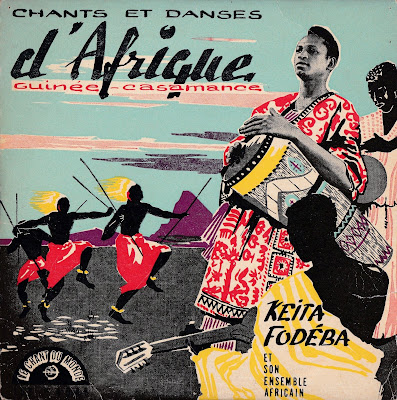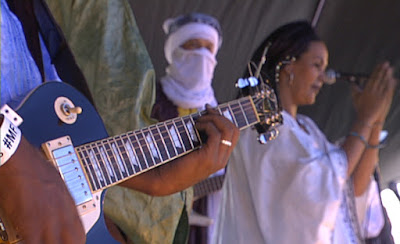 |
| 1959, 7" EP, Le Chant du Monde #LDY.4048 - 33 tours 1/3 |
So happy to be able to present to you all the 1959 EP by Fodeba Keita et son Ensemble Africain with music from Guinee & Casamance. The order of that title is actually not according to what's on the disc, as there are first 4 tracks from Casamance [in creole] and then 2 tracks from Guinee [in soussou].
And more strange things with this EP, as checking info about it on the internet, I think I have the original first issue 1959 sleeve with a later reissue disc. I base that on comparing the versions of labels I have seen on various sites. I even sent an inquiry mail to those currently owning "Le Chant du Monde", musicsales.co.uk, but so far no reply.
Furthermore I think that although the disc is dated 1959, the recordings and preparations of it were done before on 1958.Oct.02 Guinee got back its independence from France. This EP is subtitled "Chants et Danses d'Afrique", while a later reissue "Chants et Danses de Guinee".
Liner Notes [in French]
La familiere Europe avec ses czardas, ses tarentelles, ses flamencos, legitimement reconnus, naturalises, localises, abandonne l'amoureux du folklore, pantois, au seuil de la musique africaine.Ou donc donner de l'oreille? Ou apposer le rassurant cachet de l'authenticite?
Faut-il bailler aux monotones psalmodies documentaires des dignes ethnologues? S'effarer aux rythmes abusivement delirants des tam-tams cinemascopiques? Sourire aux pueriles exhibitions des boites negres a Paris?
Le folklore africain est-il aussi mort que l'Atlandide, aussi vierge que les forets inexplorees? Ou est le folklore africain? Mais ou sont les folklores d'antan?
Keita Fodeba ne se hasarde guere a resoudre d'aussi graves problemes. Pour lui, le folklore est bien vivant, quotidien. Il chante dans la melopee du griotte guineen, ce moderne troubadour des palabres africaines, il danse dans les refrains des creoles de Casamance.
Il dit l'amour, "fragile comme un oeuf, qui casse le sien est perdu" (Couri-Couri). Il proclame les charmes de (Carolina) ou clame une declaration d'amour par telephone (Telephonista). Et s'il accompagne les festivites traditionelles de la Circoncision, il donne aussi la recette du "mari ideal".
Bon pied, bon oeil, le folklore africain se moque des etiquettes et des puristes, il chante, donc il est.
--Dessin de G. JUSTH
Listen to the opening track:
GUINEE 1958 EP - Fodeba Keita [vinyl]
Fodeba Keita et son Ensemble Africain - Chants et Danses d'Afrique - Guinee & Casamance
1959, 7" EP, Le Chant du Monde #LDY.4048 - 33 tours 1/3
a1.Couri-Couri / a2.Aloa / a3.Carolina // b1.Téléphonista / b2.Laila / b3.Saidouba
tracknr.a1-b1: Casamance, dialecte creole portugais
tracknr.b2-b3: Guinee, dialecte soussou
Kante Facelli - guitare / Achkar Marouf et Yansané Kerfala - solistes
Fodeba Keita
 Keita Fodeba was born 1921.Jan.19 in Siguiri [city in northeastern Guinee on the River Niger]. After completing his primary education in Conakry, the capital of Guinea, he attended William Ponti Institute in Dakar (Senegal). In 1944, he graduated with a teaching degree from Dakar. After teaching high-school students a couple of years in Senegal, he moved to Paris in 1948 and became an avid researcher of theater and dance. Eventually, in 1949, he founded The African Theatre of Keita Fodeba.
Keita Fodeba was born 1921.Jan.19 in Siguiri [city in northeastern Guinee on the River Niger]. After completing his primary education in Conakry, the capital of Guinea, he attended William Ponti Institute in Dakar (Senegal). In 1944, he graduated with a teaching degree from Dakar. After teaching high-school students a couple of years in Senegal, he moved to Paris in 1948 and became an avid researcher of theater and dance. Eventually, in 1949, he founded The African Theatre of Keita Fodeba.The first Les Ballets Ahicains performance was staged at the Theatre Etoile de Paris in 1952 November. It was an instant success. After touring in France for a couple of years, Fodeba brought his company to Africa in 1955 and produced an extensive tour among French Colonies of West Africa. During that trip, he was selected to be Minister of Interior of the Republic of Guinea by Guineas former President, Ahmed Sekou Toure.
Fodeba later was invited to be the head of Defense and Security of Guinea, during the country's war to gain independence. After changing several positions within the government, he got arrested for political reasons on 1969 March 21 [ed.: not 1965 as in pdf] and was killed in prison. Guinea still mourns Keita Fodeba as the teacher who pioneered a dance company that connected African culture to the rest of the world and introduced its legacy with style and elegancy.
source: 2003/04 program of US Tour by Ballet Africains [pdf]
Kanté Facély
[= Kante Facelli, playing guitar on "Chants et Dances d'Afrique - Guinee Casamance"]
Kanté Facély was born in 1922 in Kissidougou [city in southern Guinee], where he had attended primary school until the middle course. In 1944, when learning to play the guitar by practicing tunes from Guinee, in Saint-Louis in Senegal he met Keita Fodeba. They became friends and together created an orchestra called "Sud Jazz". Facély was the principal animator of the orchestra, mainly intended to let people in Senegal hear the immense resources of the folk music from the Casamance to Cameroon. Later on they together started the artistic group called "Progrès". In 1948 Fodeba left Senegal and his friend and went to Paris, where he started another group, which over timer became the Ballet Africains. Some years later Facély reunited with Fodeba in Paris, joined thegroup and became the artistic director, the real soul, of the Ballet.
For Fodeba Facély was not only for a musical collaborator, but also a friend and a brother. His contribution to African art were immense, he was the first to record a rich repertoire of African songs magnifying, at a time when it was difficult, the magnitudes of the African past and embodying therefore the most dignified patriotic feelings.
Kanté Facély died in the night of 1961.Jul.11-12, when returning home from an international tour with the Ballet, his plane on its way from Prague to Conakry crashed in Casablanca. With his death African art lost one of his pioneers.
bio based on "Obituaire by Keita Fodéba and Declaration by président Sékou Touré"
More about Fodeba Keita and the Ballets Africains
When collecting information for this post, I came across a lot of information about the Ballets Africains, programmes, articles, reviews, pictures, sounds and videos. Most are included in the download, here are some links for direct enjoyment:- Keita Fodeba et son ensemble Guinéen - Minuit: poème mandingue [2x78T, recital of poem "Minuit" in 4 parts] - listen at bibliotheques-specialisees
- Keïta Fodeba et son ensemble africain - Laincima / Couri-couri [78T, incl.early version of the first track on the EP] - listen at bibliotheques-specialisees
- Pictures at gettyimages [a mix of 1950s/60s and more recent]
- 1950.Jan.19: Keita Fodeba et son Ensemble Guinéen - Theatre Program 1949-1950 [French]
- 1954.March: Program [French - 2 versions at tce-archives.fr: 1690 and 1693]
- 1954.May: the "ballet troupe" of Keita Fodeba featured in the Italian film "Carosello Napolitano" [dir.Ettore Giannini] - watch a scene at youtube
- 1959.January: The True Meaning of African Dances - article by Keita Fodeba [The Unesco Courier, pages 18-23] - available at numeridanse.tv
- 1963.Sep.27: La Guinée, cinq ans après - Guinee, 5 years later [meaning: 5 years after independence from France] - TV report for "Sept jours du monde" [14:58], mainly interview with Sekou Toure, including short clips of a.o.Ballets Africains [ca.8:00] and Les Amazones de Guinee [ca.10:15, I think] - watch it at fresques.ina.fr
- "Chants et Danses de Guinee" version of the EP was in 2011 posted at soulsafari [not the whole EP, only 2 tracks]
 |
| label side A - differs from orginal "d'Afrique" and later "de Guinee" reissue I have seen if anybody has more info about the issued versions, please comment to this post |
PS: I'm very curious about the following details of my EP
- the card which was inside the sleeve [incl.basic info about and a number, 195]
- name written on backside of sleeve: BEEREN [underlined]
- mixe-up of original 1959 sleeve with reissue version of disc [I think]
- the earlier posted "Chaque Peuple sa Culture Vol-2" has a name written on the label of side A: SYLLA [encircled]




